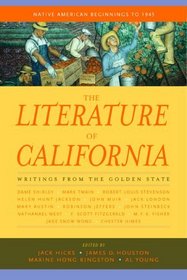Search -
The Literature of California, Volume 1: Native American Beginnings to 1945
The Literature of California Volume 1 Native American Beginnings to 1945
The Literature of California is a landmark publication-unmatched by any existing collection and distinguished by its breadth, variety of sources, and historical sweep. The editors have been refreshingly inclusive and imaginative in their selection: some of the writers are internationally known, others are anthologized here for the first time. Th... more »
The Literature of California is a landmark publication-unmatched by any existing collection and distinguished by its breadth, variety of sources, and historical sweep. The editors have been refreshingly inclusive and imaginative in their selection: some of the writers are internationally known, others are anthologized here for the first time. Th... more »
ISBN-13: 9780520215245
ISBN-10: 0520215249
Publication Date: 12/4/2000
Pages: 870
Rating: ?
ISBN-10: 0520215249
Publication Date: 12/4/2000
Pages: 870
Rating: ?
0 stars, based on 0 rating
Publisher: University of California Press
Book Type: Hardcover
Members Wishing: 0
Reviews: Amazon | Write a Review
Book Type: Hardcover
Members Wishing: 0
Reviews: Amazon | Write a Review
Genres:
- Literature & Fiction >> General >> Classics
- Literature & Fiction >> World Literature >> United States >> Asian American & Pacific Islander >> General
- Literature & Fiction >> World Literature >> United States >> Asian American & Pacific Islander >> Kingston, Maxine Hong
- Literature & Fiction >> World Literature >> United States >> Classics >> General
- Literature & Fiction >> World Literature >> United States >> Anthologies
- Literature & Fiction >> Authors, A-Z >> ( K ) >> Kingston, Maxine Hong




